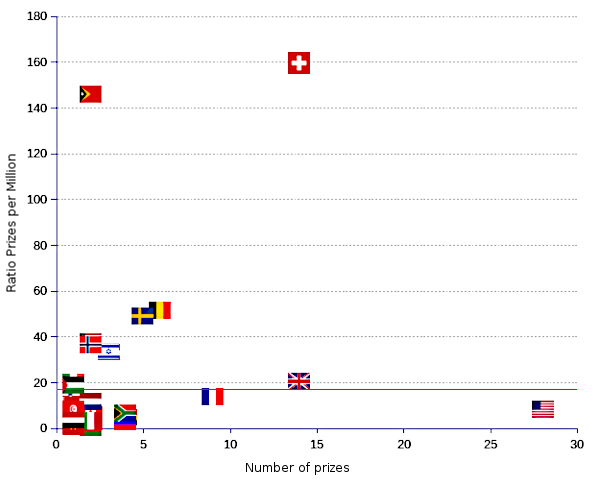areppim: information, pure and simple

Switzerland, the home of Henry Dunant, the founder of the Red Cross, and the hosting country of a large number of international organizations dedicated to peace and the good of mankind comes at the top of the ranking per capita, closely followed by Timor-Leste that, with a little more than one million inhabitants, received two awards.
The Nobel prize for peace is regretfully marred by the Nobel committee's questionable choices that raise dark suspicion about the members' deep motivations. The prize is expected to be a plain recognition of outstanding efforts to prevent or hinder conflict, and to alleviate sufferings from war, planned violence, and organized abuse. Instead it increasingly appears as a manipulative tool to promote hidden agendas and influence public opinion.
How can one reconcile the presence amongst Peace laureates of dedicated civilian humanitarians such as Henri Dunant, Fridtjof Nansen or Desmond Tutu side by side with "Realpolitik" belligerent die-hards whose names are irremediably linked to the killings of innocent people? Take, for instance, Theodore Roosevelt, the "big stick" swinger, the author of the eponymous "corollary to the Monroe doctrine", the warmonger who engineered a Latin American revolution to dig the Panama Canal, and waged war against Spain in Cuba and the Philippines. Or Henry Kissinger, the sponsor and mastermind of the 1973 coup in Chile. Or the drone assassination boss Barack Obama, such a nice chap in his idle time. Or Abiy Ahmed, the smiling Prime minister of Ethiopia, who gladly engaged in a brutal civil war just upon returning home from collecting his Nobel medal in 2019. Their names are better fitted for a black-book of crime, rather than for a list of peace advocates.
The only achievement that the Nobel committee could genuinely feel proud of is that of bringing to the same bed such philosophical opponents as the cynical Machiavelli, who claims that the interests of the ruler nullify all other considerations whatsoever, and the equitable Montesquieu who propounds to take the legislative and judicial power away from the hands of the executive ruler as the only means to foster a bearable world.
![]() Take a look at the complete list of Nobel prizes for peace
Take a look at the complete list of Nobel prizes for peace
| Country | Number ¹ | Population 2024 | Per capita |
|---|---|---|---|
| (millions) | (number÷million×100) | ||
| Argentina | 2 | 47.2 | 4.2 |
| Austria | 3 | 9.1 | 33.0 |
| Bangladesh | 2 | 172.4 | 1.2 |
| Belarus | 1 | 9.4 | 10.7 |
| Belgium | 6 | 11.8 | 51.0 |
| Canada | 2 | 39.3 | 5.1 |
| China | 2 | 1,457.9 | 0.1 |
| Colombia | 1 | 52.0 | 1.9 |
| Congo, Democratic Republic | 1 | 104.1 | 1.0 |
| Costa Rica | 1 | 5.3 | 18.9 |
| Denmark | 1 | 5.9 | 16.9 |
| Egypt | 2 | 111.7 | 1.8 |
| Ethiopia | 1 | 129.7 | 0.8 |
| Finland | 1 | 5.6 | 18.0 |
| France | 9 | 66.1 | 13.6 |
| Germany | 4 | 83.5 | 4.8 |
| Ghana | 1 | 34.4 | 2.9 |
| Guatemala | 1 | 19.6 | 5.1 |
| India | 2 | 1,445.0 | 0.1 |
| Iran | 2 | 88.8 | 2.3 |
| Iraq | 1 | 45.2 | 2.2 |
| Ireland | 1 | 5.1 | 19.6 |
| Israel | 3 | 9.3 | 32.2 |
| Italy | 2 | 59.9 | 3.3 |
| Japan | 2 | 124.0 | 1.6 |
| Kenya | 1 | 60.0 | 1.7 |
| Liberia | 2 | 5.7 | 35.1 |
| Mexico | 1 | 135.3 | 0.7 |
| Myanmar | 1 | 56.5 | 1.8 |
| Netherlands | 2 | 17.3 | 11.5 |
| Norway | 2 | 5.7 | 35.4 |
| Pakistan | 1 | 242.2 | 0.4 |
| Palestine | 1 | 5.7 | 17.5 |
| Philippines | 1 | 116.8 | 0.9 |
| Poland | 1 | 37.5 | 2.7 |
| Russia | 4 | 145.1 | 2.8 |
| South Africa | 4 | 62.8 | 6.4 |
| South Korea | 1 | 51.3 | 1.9 |
| Sweden | 5 | 10.4 | 48.1 |
| Switzerland | 14 | 8.9 | 156.7 |
| Timor Leste | 2 | 1.4 | 138.3 |
| Tunisia | 1 | 12.3 | 8.1 |
| United Kingdom | 14 | 69.3 | 20.2 |
| United States | 28 | 340.4 | 8.2 |
| Viet Nam | 1 | 101.1 | 1.0 |
| Yemen | 1 | 33.1 | 3.0 |
| Total | 142 | ||
| Median | 4.5 | ||
| Average | 16.4 | ||
| ¹ Nations are those of the laureate's citizenship, or of the location of the institution's headquarters. Former Soviet Union appears under Russia. | |||
Sources: Nobelprize and UN Population Division